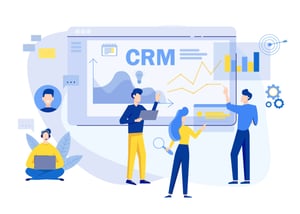- SERVICES
- HIGHER EDUCATION MARKETING
- ENGAGEMENT & ENROLLMENT MANAGEMENT
- STUDENT RECRUITMENT AGENCIES
- PROFESSIONAL EDUCATION & TRAINING
- WHO WE ARE
WHO WE ARE
Learn more about Keystone Education Group, including our leadership structure, why choose Keystone as your educational partner, and company press releases.
QUICK LINKS
- RESOURCES
RESOURCES
Find a range of helpful resources to help with your educational marketing. From on-demand webinars, reports & data, to customer testimonials and our downloadable media kit.
QUICK LINKS
- NEWS
- REQUEST A CALL

- Keystone Higher Education News
- Do you need a CRM? Evaluating CRMs for Higher Education
Most colleges and higher ed institutions need some sort of CRM system to manage their data.
With prospective students, alumni, staff and suppliers, there is a lot of information to be managed.
Whether you use a mix of emails, papers and Excel files, a Customer Relationship Management System (CRM) organizes and manages all the details of prospective and active customers, as well as logging any interactions.
It simplifies the processes while improving relations.
Why are CRMs helpful for Schools & Universities
A growing number of higher education institutions (HEIs) are turning to CRM software to gain an edge in an intensely competitive industry. CRM expert Rolustech says, “CRM is an amazingly powerful tool which if properly leveraged can provide valuable insights about your customers, allowing you to develop stronger and more personal relationships not just with prospective and current students but also the alumni.”
Some of the key benefits identified by Rolustech for HEIs are:
- handling student inquiries and follow-up
- managing the complete student admissions life-cycle from one comprehensive platform
- integrated tracking tools for leads across multiple management programs for better marketing budget planning and resource allocation
- monitoring fee payments and reminders
- building long-lasting alumni relations; enriching student life-cycle management
- generating real-time reports to assess organizational performance
The takeaway? For HEIs looking to improve on their enrolment goals by maximizing the impact on the student experience, CRMs have the potential to deliver - and then some.
However, while CRMs may offer a host of benefits, they may not always be the right fit for an organization. We weigh up a few considerations to keep in mind when making your evaluations.

- Cost of Implementation
The main reason a HEI won’t have a CRM is due to the cost. According to Workzone, “A state of the art CRM system requires both a hefty financial investment and substantial IT resources, not to mention the toll on often already very stretched enrollment teams.”
- One Size Doesn’t Fit All
There are a lot of CRM providers so finding one that fits your specific needs is imperative. Many CRMs are designed to work across industries, however, this sometimes means a function you would hope to see is not available without further development of add-ons. The best advice is to start by with assessing your institutional goals, then determining which features and functionalities you need to reach them.
- Ease of Adoption by Employees
Employee use is also vital when evaluating a CRM. A CRM is only as good as its adoption. In order to make the most of your CRM, your employees must embrace it. Choosing a CRM that is easy and intuitive reduces training requirements while increasing the chances your employees will actually use it.
- Security & Data Protection
There’s also the matter of security. The type of information your CRM will host is often sensitive and must be protected. If not, then you can be open to many liabilities. It is important to assess CRMs for their security features, including ensuring data loss prevention and disaster recovery capabilities are a standard.
- Needs of Your Organisation
Most CRMs are highly complex software solutions, requiring IT technicians and implementation specialists to ensure a smooth transition. For some smaller institutions, this may not be necessary. Sometimes simple is better – evaluate what is best for your organization.
Overall, the decision process regarding whether you should use a CRM or go for an alternative is something that should not be taken lightly.
At Keystone, we have developed SmartHub, a system designed specifically for higher education, linking CRM lead management and marketing automation. An affordable solution for institutions of all sizes, SmartHub is ideal, whether you need an out-of-the-box CRM alternative or pre-CRM lead nurturing and marketing automation tool. Contact us to learn more about SmartHub today.
Related Tags
Just For You
Top Picks
Higher Ed Chats Podcast
Listen to the latest episodes of our Higher Ed Chats Podcast - new format for 2024. Hear from Higher Ed thought-leaders from around the world!
Who Will Win The Keystone Awards?

Watch the Keystone Awards Ceremony to see the winners of the 2025 Keystone Awards!
Subscribe
to get the latest news and updates





